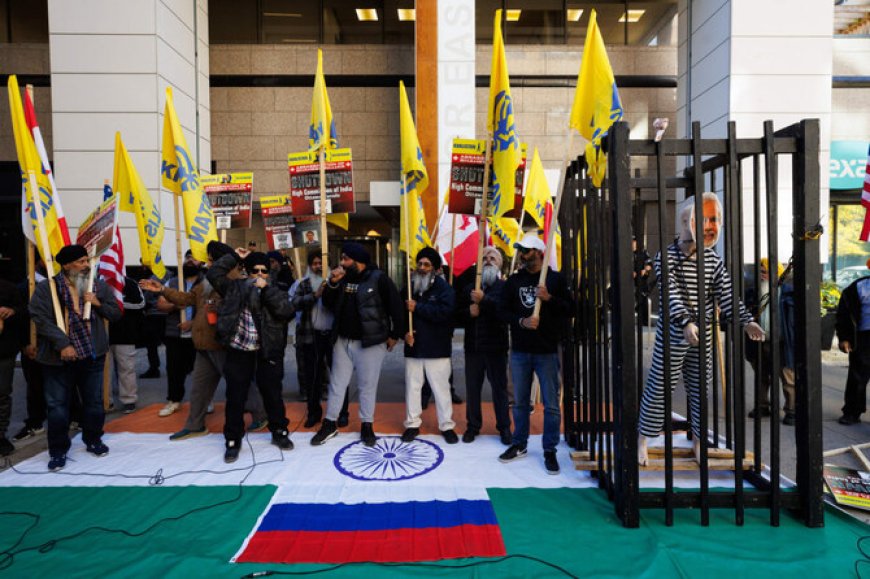Canada's Allegations Against India Support Long-standing Issues of Sikh Activists

Recent claims by Canadian Prime Minister Justin Trudeau against the Indian government have highlighted the tense relations between the two nations, but for Sikh activists living in Canada, the disclosures have been a validating point. Trudeau's assertions—including the murder of Hardeep Singh Nijjar in 2023—that India has been undertaking a campaign of intimidation, violence, and threats against Canadian-based Khalistan supporters reflect what many Sikh activists have been claiming for years.
Last year, Vancouver saw the murder of naturalized Canadian citizen Hardeep Singh Nijjar, a strong supporter of Khalistan, the campaign for an autonomous Sikh homeland in Punjab state,. Canada's charges squarely target the Indian government, accusing it of planning Nijjar's death and waging a more general campaign to silence opponents overseas.
For many of the Sikh diaspora, these revelations have validated long-held misgives. 42-year-old Khalistan supporter Harinder Sohi said the Canadian government's declaration was "very validating". Speaking at a demonstration outside Toronto's Indian consulate, Sohi discussed how campaigners have always felt India poses a threat to the Sikh population in Canada. Reflecting the anxiety and dissatisfaction mounting among the community, Sohi remarked, "It is shocking that we as Canadian citizens have to live in fear of a foreign government."
Though small in turnout, the demonstration had a strong message. Protesters built a mock prison cell around an effigy of Indian Prime Minister Narendra Modi, brandished yellow Khalistan flags, yelled slogans calling Modi a "terrorist," The general attitude among the demonstrators highlighted the strong suspicion of India's government and the supposed danger it poses for Sikhs supporting Khalistan.
Trudeau's public approach on the matter has attracted a lot of interest. The prime minister of Canada underlined in a speech during an investigation on foreign influence that the accusations against India were not meant to be used as a means of cutting diplomatic relations. He did, however, make it very evident that the actions of the Indian government had infringed Canadian sovereignty and that his administration, together with the Royal Canadian Mounted Police, felt obliged to go public to defend people. Trudeau said that the safety of Canadian people comes first even with diplomatic ramifications.
The Khalistan movement's roots run back to India's 1947 independence, and support for the cause inside India has been greeted with severe crackdowns. Modi's government has adopted a strong stance toward any manifestation of Khalistan support in recent years. Director of Sikhs for Justice, an advocacy group backing the campaign, Jatinder Singh Grewal thinks India is trying to limit support outside to stop the problem from spreading within Punjab. Grewal pointed out that if the diaspora can talk about Khalistan without restriction, it could inspire Sikhs living in India to wonder why they cannot follow suit.
Although members of the Sikh community have hailed Trudeau's charges, they have also sparked discussions on internal political motivations. About two percent of Canada's population, or roughly 770,000 Sikhs, live there; concentrated cities like Toronto and Vancouver house notable numbers of them. Especially in national elections, the political power of the Sikh community has been noteworthy. Historically, Trudeau's Liberal Party has sought support from the Sikh population; some detractors say that political considerations may be behind the latest charges directed against India. Former government foreign policy advisor Omer Aziz stated in a post for *The Globe and Mail* Trudeau's attitude on Sikh problems could be affected by worries about losing votes to the left-wing New Democratic Party, headed by well-known Sikh politician Jagmeet Singh.
Notwithstanding such objections, many activists reject the theory that Trudeau's actions have political motivations. Attending Toronto's Friday demonstration, Inderjeet Singh Gosal contended that the prime minister's choices were based on moral values. "I simply believe Justin Trudeau is acting according to his values. Reflecting the attitudes of many who feel Trudeau is advocating justice rather than courting votes, Gosal remarked, "He believes in rights and he believes in keeping his Canadian citizens safe."
The Sikh diaspora stays at the core of the debate while Canada and India negotiate the aftermath from these accusations. Although Trudeau's government is trying to keep diplomatic relations intact, the charges have simply sharpened the determination of people supporting Khalistan and other Sikh causes. Though it runs the danger of widening gulf between Ottawa and New Delhi, many activists see the Canadian government's acknowledgement of their issues as a major turning point in their long-standing fight.













































